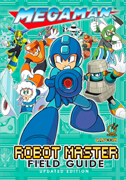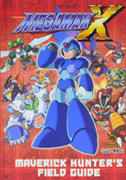
The Blue Ink: Archie’s Mega Man #17 – Origins
 “Playing God is indeed playing with fire. But that is what we mortals have done since Prometheus, the patron saint of dangerous discoveries. We play with fire and take the consequences, because the alternative is cowardice in the face of the unknown.” -Ronald Dworkin, Sovereign Virtue
“Playing God is indeed playing with fire. But that is what we mortals have done since Prometheus, the patron saint of dangerous discoveries. We play with fire and take the consequences, because the alternative is cowardice in the face of the unknown.” -Ronald Dworkin, Sovereign Virtue
“Children are the keys of Paradise… they alone are good and wise. Because their thoughts, their very lives, are prayer.” -Richard Henry Stoddard
—————————————-
If you couldn’t tell by now, I like to find quotes that offer a bit of insight into the major themes and issues that each comic presents. It’s kind of like the bible readings you get before a sermon: They cue you in to what the speaker’s planning on talking about. Well, in spite of the best wishes of my Great Aunt Elma, I’m not a preacher, and happier for it, I think: Religiously, I’m a half-Methodist, half-Presbyterian with this glaring streak of secular humanist. I doubt there’s a branch of the Christian faith that covers that particular outlook.
The first quote refers to Prometheus, one of my favorite figures in mythology. The bringer of fire, of knowledge, of technology, of everything that allows mankind to grow and evolve. Cast down by the gods for passing along divine secrets, humanity’s greatest friend and benefactor is punished for eternity. In a sense, this short little jaunt is all about Prometheus, thematically: Light, Wily, and Blues all take on aspects of that Titan who gave humanity the keys to the kingdom. The keys in this case are the secrets behind advanced robotics… creating a race that will become man’s equal, and in time, perhaps his superior.
We begin with Mega Man sorting through some old records of Dr. Light’s robots, and stumbling across a notation for DLN-000… a robot reported missing. He confronts his creator, and Dr. Light finally tears the band-aid off his oldest wound so he can tell his son the truth: “You aren’t my first boy. There was another.”
Enough of a time ago that Dr. Wily was still on better speaking terms with Dr. Light, and his hair was in a ponytail versus the twin-pronged devil horn configuration he sports later on, a thin and virile Dr. Thomas Light was putting the finishing touches on his newest and bestest creation: A prototype humanoid advanced robot who he would call “Blues.” Notice also that Blues was built as part of a weapons development program; Light has yet to go fully anti-war in his stance. He still pays the devil’s due, because the military has the money, and he needs it.
But there’s also that strong sense of parental guidance in him: Blues is more than a robot. Holding to the line that will forever separate him from his comrade, Light believes robots are more than machines, that if they are made human, if they learn, that they will be possessed of willful spirits of their own. Hence, Blues is his son, first and foremost.
After activation, Light brings him into the world and shows him the wonders in it. They go to art museums and music concerts. They go shopping and Blues gets his trademark yellow scarf/bandana from a window display at a department store. Light exposes his son to the culture, what makes the world a bright and wonderful place, and watches with pride as his son grows and develops. And yet he’s still surprised when Blues takes all that he’s learned and has an original thought, an original composition.
An original song.
And yes: That is the actual melody written out. They include the slide at the beginning, which I leave out sometimes. I love his whistle. Love it. It’s always been the best part of who he is. You hear the whistle, and you know that things are gonna be okay. In Mega Man 5, they turned it on its head a little bit, having the impostor Proto Man whistle it out of tune before the original showed up and BADONKED him. “Sing it right, you daft goose!”
The end effect of his exposure to the world around him, to Light’s unapparent parenting, is that Blues has become his own individual, with his own thoughts, his own hopes, his own dreams. Like a real child, he sees the world and his own potential in it, and he is eager to make his loving father proud. Light likes to say that his robots are his children: Blues is his first test of that principle. It is a test that he will fail.
All culture and easy living aside, the day comes when the military demands to see the results of Light’s work. Blues is suited up with a Sniper Joe-ish helmet and armed with a super shooty arm cannon, and then he hits the field of battle. His targets are all automated gun-drones, and he quickly starts blasting through them, astonishing everyone with the potential of robotic warriors. But all that fighting puts a strain on Blues’ systems, and he starts to short out, leaving him open to the attacks of the hover-drones.
In a panic, Light stops the test and gets out to the field, diagnosing the problem: He installed Blues’ power generator incorrectly, resulting in an imbalance. It’s kind of like messing up the timing belt in your car’s engine, from what I read into it: It makes it so you don’t get the full power transfer you expected, and can lead to a whole host of other problems. Though the military is disappointed in Blues, they see the potential in the technology, and urge Light to develop a less advanced, less power-hungry model: These will become the Sniper Joes that Mega Man will later fight against.
Blues comes to back in the lab, and walks in on Light and Wily while they argue over whose fault Blues’ malfunction really is. That of course causes them to start throwing more personal barbs back and forth. Stopped by Blues, Light explains that he wants to take Blues offline so he can redesign his boy’s power core. Wily argues against it, saying that taking Blues offline for that much time might erase his personality data and destroy who Blues is. And as Light leaves to get to bed, Blues whispers the question that neither doctor hears, but should:
“But what about what I want?”
Later that night, he goes to Light’s room, wanting to speak with his father about his concerns. But he overhears a conversation that turns his wavering heart into a lump of cold iron.
While speaking with a younger, hotter, Hellooooo Nurse Dr. Lalinde, Light makes the mistake of speaking those fatal words: “It’d be easier if I removed that rebellious streak. If I altered who he was.” And this is the tough part about being a parent: Watching your children grow and become their own individuals, trying to decide how much to mold them, how much to force them to your way of thinking. Light makes his mistake, and Blues hears him. Our man in red realizes, perhaps wrongly, that if he is going to remain as he is, then he has to strike out on his own. He will either leave, or Light will destroy him in his efforts to save him.
It is necessary for the story. The son must abandon the father. The eldest must become the wanderer, a robot without a home. Prometheus must be banished from Olympus.
It makes it no less heart-breaking.
—————————————-
Oh boy, oh boy! You know what time it is? It’s time for some Guts Man filler! No, not that kind of filler…
We still have a few pages to use up in this issue, and Guts Man is always the comical choice when you want to have some fun. But wait, what’s this? A new challenger approaches! DLN-065, Concrete Man!
This is why you never put two Betta male fish together in the same tank: They end up tearing each other apart deciding who’s the Alpha Male. The problem with Guts Man, besides his posterior and his supreme hugeness, is that he’s got a big ego to match. Concrete Man has been brought by Dr. Light to help repair a dam that Gutsy is working on, and if you can’t tell by the picture, it’s raining and there’s a high probability of flash flooding. Finishing the project is a must.
Naturally, they don’t get along. How can they? They’re basically the same! But when push comes to shove, like Spongebob and Patrick who are forced to cooperate to save a baby egg when its warming light goes out, Guts Man and Concrete Man manage to get their bricks together in time to save the dam before it collapses and drowns out the whole city.
It’s a short little piece, filler in the best terms, but I’ll admit, it’s nice seeing Gutsy again. And after the job is done and they shake hands, what do these two do to wind down? Do they drive into town, pick up a couple of floozy hookerbots and void their warranties all night long? Nope.
They hit up a Karaoke bar and sing a sloppy rendition of Rockman 8’s ending theme by Ganasia while chugging down Asahi Super Dry beer… er, E-Tanks, I mean. Points to the Archie crew for actually finding a translation for that song… and using it.
———————————————-
Filler is a controversial thing: Anime renditions of certain manga use them to fill in the gaps between the manga-based story arcs, or to wait until the manga “catches up” with them. Cartoons and other shows that rely on an ongoing storyline instead of an episodic format can dabble in this as well. Some of the most successful shows on the air today, like NCIS and Burn Notice, use a blend of both: Episodic with dashes and hints of the main “season plot” sprinkled in.
The Guts Man segment was clearly filler. After all, it’s Proto Man on the cover (and in a very deceptive pose, because at no time is he setting stuff on fire and scaring people), and the bulk of the issue focused on him. We finally got a thorough look into his past, which matches the canonical biography: Malfunctioning power generator, fled because he didn’t want to be messed with.
Aside from that, we saw a different perspective of Wily than I envisioned during the formative years of Blues’ existence. This is a Wily who has some sympathy towards robots. Though he won’t come out and call them his “children” like Light does, he also doesn’t see Blues solely as a machine. He holds Light responsible for the malfunction inside of Blues’ power generator, and argues against a total overhaul, on the basis of fearing loss of personality data.
The Wily I envisioned in GRL was much more pragmatic: He hated pronouns applied to robots, always corrected Light by calling robots “it” instead of he or she, and saw them as tools… a means to an end, not a new species. The Wily presented in the comic flashback is a more sympathetic fellow. His edges are rounded off, his ambitions are driven not by madness, but a desire to be the best. His misanthropic attitude is the result of bitter pills swallowed over too many years of being overshadowed, of being blamed, of being scapegoated. Actually, I did that too… only here, it’s his own fault, rather than the result of external power-mongering.
It is small wonder that Blues feels a sense of obligation and gratitude towards Wily: Not only did the “mad scientist” repair him with a new nuclear-powered generator, but he managed to keep his personality intact. That is something that, in Blues’ mind, Light never planned on. This is another heavy issue, and it’s one that had to happen: First time readers wouldn’t know the background behind Proto Man. They wouldn’t know the tragedy of this Promethean figure. It was a story that needed to be retold.
Perhaps that’s why we had some filler with Guts Man in this issue: The Proto Man origin story is some heavy duty stuff. Kids reading this comic are going to grow up fast: The world of Mega Man is a dangerous one, and you have to harden up to survive in it. After something that heavy, we needed a little Guts Man to brighten up our day.
Maybe things will never be perfect. Maybe Proto Man and Dr. Light will never fully make amends with each other, and the family of Light will remain fractured. Maybe all will be forgiven, and Proto Man will join the battle against Wily. Whatever’ll happen, I’m sure that we won’t end up with the Ruby Spears possibility: Proto Man just being Wily’s second-hand mook.
Proto Man’s too damn awesome to stay in Wily’s shadow. It wouldn’t do, after all; someone who wears sunglasses can’t always stay in the shade.
For the Blue Ink.
—–
When he isn’t writing “The Blue Ink” reviews for The Mega Man Network, Erico (The Super Bard) spends his days keeping track of the “Legacy of Metal” fanon, dabbling in cooking and tea-brewing, and exploring the human condition from his Iowa stomping grounds.
The views expressed here reflect the views of the authors alone, and do not necessarily reflect the views of The Mega Man Network.
Prev/Next in Category(s)
Prev/Next by Date










Comments